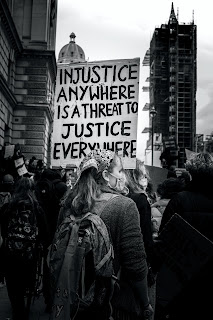Day 11 and 12 – Critical thinking + critical consciousness + critical pedagogy
 |
| Photo by Chris Briggs on Unsplash |
Day 11 and 12 – Several years ago, I found an article about critical pedagogy that I really liked. I started using this article in my theories classes for our first meeting. Why study critical thinking and what is critical pedagogy? In Fernandez-Balboa (1993) early article on critical pedagogy, he offers a useful bridging of the concepts of critical thinking, critical consciousness, and critical pedagogy. From the very outset of his essay, he writes, “making critical thinking be really critical means to include as its ultimate goals the achievement of students’ emancipation and the implementation of committed action for social justice” (p. 61).
This statement answers the big “why!” The very idea that a commitment to social justice and emancipation can be part of what it means to think critically is very appealing. After all, aren’t those goals at the heart of what being a “therapist” means to me? Being personally free from one’s own imprisonments and working towards a more just society for all have been main motivations for me in this work.
And yet, from the beginning we must ask whose emancipation and from what? And whose justice, in which social context?
In their article, Training Counseling Psychologists as Social Justice Agents: Feminist and Multicultural Principles in Action, Goodman et al. (2004) cite Janna Smith’s (2003) definition of social justice,
a socially just world is one in which every person has access to the following:
Adequate food, sleep, wages, education, safety, opportunity, institutional support, health care, child care, and loving relationships. “Adequate” means enough to allow [participation] in the world . . . without starving, or feeling economically trapped or uncompensated, continually exploited, terrorized, devalued, battered, chronically exhausted, or virtually enslaved (and for some, still, actually enslaved). (Smith, 2003, p. 167 as cited in Goodman et al, 2004, p. 795)
Once again, this requires committing oneself to understanding the ways societal values, policies, practices, and structures, serve to privilege some, disadvantage others, marginalize some, and guarantee others’ rights to self-determination. How do our very concepts of safety, health, development, care, love, participation, value, and fair compensation get shaped by culture?
Fernandez-Balboa’s description of the social construction of reality and the inculcation and dissemination of hegemonic ideology offers an important introduction to these ideas. A commitment towards social justice not only requires us to recognize social injustice, but to recognize the dominant narratives that define “reality” and the dominant discourses which keep “us” from being truly free to be ourselves.
Fernandez-Balboa, J.-M. (1993). Critical pedagogy: Making critical thinking really critical. Analytic Teaching, 13(2), 61-72.
Goodman, L. A., Liang, B., Helms, J.E., Latta, R. E., Sparks, E. & Weintraub, S. R. (2004). Training counseling psychologists as social justice agents: Feminist and multicultural principles in action. The Counseling Psychologist, 32 (6), 793-838.



Comments